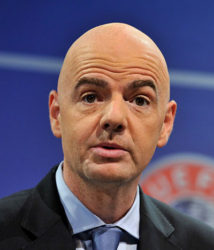 Political ploy or developmental push? For many this is the contrasting argument being bandied around by pundits following FIFA’s decision to expand the World Cup entrants to 48 nations in 2026.
Political ploy or developmental push? For many this is the contrasting argument being bandied around by pundits following FIFA’s decision to expand the World Cup entrants to 48 nations in 2026.
Of the 211 member associations, 7.6% have now been offered an olive branch by the ‘very generous’ FIFA council, in a move that is supported by current leader Gianni Infantino pre and post-election.
According to the reports, 16 groups featuring three teams (22.7% of FIFA membership) each will highlight the traditional opening format, with the top two finishers advancing to the knockout rounds.
There will not be an increase in the duration according to the powers that be, (the event will only last 32 days) although there will be an additional 16 games to the current quota of 64.
However expansion has not always equated to development. Call it what you will, FIFA’s decision to expand the World Cup is nothing short of political.
Infantino, the former UEFA General Secretary of now disgraced Michel Platini, simply continues the agenda of his FIFA predecessors, with his decision to propagate expansion to an unprecedented level.

This attempt reeks of political undertones and is simply being done to reward Infantino’s constituents, while in the process consolidating his power for future electoral congresses.
Greed plays a major part in this episode, with the governing body zeroing on the dollar signs at the expense of quality. How else can you explain the lightning speed with which this plan was brought before the FIFA council without proper consultation from various stakeholders?
Former US President Ronald Reagan famously said “Politics is supposed to be the second-oldest profession. I have come to realize that it bears a very close resemblance to the first”.
Many agree with the former leader of the free world as, the World Cup Tournament is now being prostituted for the most common of vices.
This supposedly ‘August institution’ has been plagued with corruption during recent times. The maneuver basically adds to the growing list of suspicious dealings and improprieties under the guise of development in a blatant manner.
There is no realistic sporting reason behind the decision, it’s simply about power and money. Reward of playing in a World Cup for a debutant translates into a reference and favor for the current leader.
77 nations have played at least one game at the World Cup, with only eight winners emerging in the 20 editions of the event. The proposed method will certainly add to the number of participants and in the same breath, dilute the quality of this sacred event.
Quantity should never be a substitute for quality in any aspect of life. While the votes of the African Football Confederation (CAF), Asian Football Confederation (AFC) and Confederation of North, Central America and Caribbean Association Football (CONCACAF) are important in maintaining one’s place at the highest office, they should not be bartered for support at the expense of the strength of the tournament. Although the new format was unanimously approved, the world body has yet to create a viable alternative format for qualification. Presently, UEFA, the second largest confederation with 55 members, are currently allocated 13 automatic berths.
This translates to 40.625% of the participants. Meanwhile the CAF, the largest voting bloc with 56 member associations, has five berths at 15.625%.
The South American Football Confederation (CONMEBOL) with 10 members, [Guyana and Suriname are in the CONCACAF zone, French Guiana is not a member of FIFA] and the AFC, a body with 47 membership, possess four berths each at 12.5% each. On the other hand, 41 member CONCACAF is allocated three berths or 9.375%.
The Oceania Football Confederation (OFC) has no automatic qualifier. In total, this equates at 90.625 of the automatic qualifiers which is 29 teams. The remaining three spots or 9.375% are presently designated by the host country and two playoff spots featuring teams from AFC, CONCACAF, CONMEBOL and OFC.
Defending champions received an automatic place up to the 2002 edition and are since required to join the ranks of qualifiers. The million dollar question is how will the 16 berths be divided amongst the six confederations, and which entities will be the major beneficiaries of this graceful charity? Also, will OFC now be given an automatic berths and what will be the formula used to realize such a grand scheme? Will an identical approach be applied to the Women’s game? The aforesaid is often treated like a FIFA stepchild. FIFA has many questions to answer. In an era highlighted by corruption at the international and club levels, where are the checks and balances to ensure transparency and integrity which were promised during Infantino’s campaign?
Previous expansions have included, moving from the original 16 [1934-1978] to 24 teams in the 1982 World Cup in Italy, and to its current format of 32 in France 1998. The inaugural edition [1930] in Uruguay only featured 13 nations.
These moves were done on sporting merit due to the advancement of the other nations at the time, especially the European members owing to their respective leagues and European Cup/Champions League.
Additionally, mediocrity should not be rewarded. Membership does not and should not guarantee participation, every nation must take part in qualifying, including five time champions Brazil. An expansion severely affects the qualification campaign for the respective confederations, rendering the process a foregone conclusion in some regions.
FIFA is not the Olympics, ‘no ‘B’ grade times’ will suffice to allow entries to the event. If the FIFA championship is to remain the pinnacle sporting event on the planet, then only the best ‘qualifiers’ should gain entry. Otherwise it will not be a World Cup but a glorified circus.



